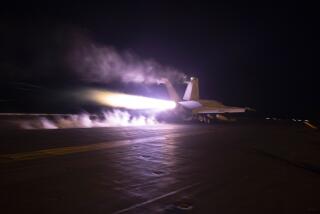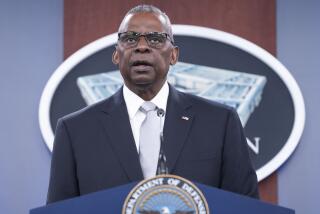Iraq Agrees to Steps to Prevent New Mishap, U.S. Admiral Says : But Investigating Team Can’t Rule Out More Attacks
- Share via
BAGHDAD, Iraq — The leader of a U.S. team investigating the Iraqi attack on the U.S. frigate Stark said today that his group has reached preliminary agreement with Baghdad on measures to prevent a recurrence of such a tragedy, but he could not rule out further accidental attacks in the Persian Gulf.
Rear Adm. David Rogers, deputy director of operations for the Joint Chiefs of Staff, told reporters that the Baghdad end of the investigation is over.
“We have established what happened and, more importantly, we’ve reached preliminary agreement with recommendations I’ll take back to Washington . . . for a mutual agreement between the two countries to prevent this type of thing from happening again,” Rogers said. He spoke with reporters before the Pentagon-State Department team of eight left for Washington.
Asked whether there are any guarantees that there will be no more Iraqi attacks on U.S. warships in the gulf, he said, “Any time that there are forces operating in proximity I can’t tell you it will never happen again.”
‘We Have the Information’
But, he added, “we’ve reached preliminary agreements which . . . will dramatically reduce the possibility it will ever happen again.”
The admiral, flanked by U.S. Ambassador David G. Newton and an unidentified Iraqi brigadier general, said the American team of Army, Navy and Air Force specialists, which arrived Monday, is “certain we have the information to piece together what happened” in the attack on the Stark.
Meanwhile, Sens. John H. Glenn (D-Ohio) and John W. Warner (R-Va.) today inspected the crippled frigate, anchored off Bahrain while awaiting repairs to enable it to sail home.
The U.S. frigate was hit May 17 by two missiles, one of which detonated, killing 37 American sailors and wounding 21 others. Iraq, which called the attack an accident, says the missiles were fired by one French-built Iraqi Mirage F-1 fighter-bomber.
Rogers refused to say whether the American investigators were allowed to question the pilot of the warplane, who the Iraqis say mistook the Stark for an Iranian target.
‘Cooperation, Forthrightness’
“But I can tell you that I’m satisfied that between the information we had from the U.S. side and the information we received in Baghdad we are able to piece together what happened,” he said.
Rogers added: “I can tell you that from the outset . . . that the reception at this end and the spirit of cooperation and forthrightness was there.”
He said the Americans and the Iraqis had “frank and professional exchanges . . . on how to preclude this from happening again. The outcome of these talks was successful.”
Rogers gave no details on the sequence of events that led to the attack on the Stark, the worst strike against an American warship since the Israeli air force blasted the U.S. destroyer Liberty in the Mediterranean during the 1967 Six-Day War.
Rogers also declined to comment on U.S. statements that the pilot received two warning signals by radio from the Stark, identifying itself as a U.S. Navy ship. U.S. Defense Secretary Caspar W. Weinberger had demanded that the Americans be allowed to interrogate the pilot. But Western diplomats have been seeking to play down the importance of the U.S. team’s seeing the pilot.
More to Read
Sign up for Essential California
The most important California stories and recommendations in your inbox every morning.
You may occasionally receive promotional content from the Los Angeles Times.













